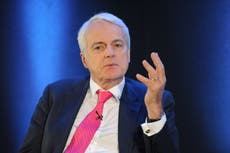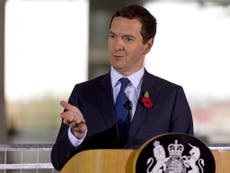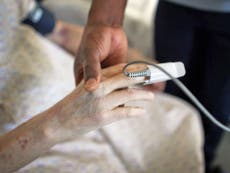Jeremy Hunt’s healthy optimism is incurable – although he's offended those at the heart of the NHS
The Health Secretary’s tenure is under threat as he antagonises junior doctors in pursuit of his promised ‘seven-day’ health service


Before the last election I was going to write about the remarkable career of Jeremy Hunt. As Culture Secretary, in 2012, he had been hanging by a thread in a who-said-what-to-whom about Rupert Murdoch’s abandoned bid to buy the part of Sky that he didn’t already own. David Cameron decided that Hunt hadn’t done anything wrong and – more to the point – that he could not afford to let journalists win a scalp. A special adviser called Adam Smith was offered as a human sacrifice and the media gods eventually moved on.
Instead of being quietly moved in the next reshuffle, however, Hunt was promoted to Health Secretary, to take the place of Andrew Lansley, one of two of Cameron’s close allies who tried to lose him the last election. Lansley’s top-down reorganisation of the NHS, which he hadn’t told anyone about when Cameron was promising no more top-down reorganisations, nearly finished off the Tories’ chances of rebranding themselves as the compassionate tribunes of socialised medicine. (The other Cameron ally who tried to lose the election was George Osborne, with his counter-productive cut in the top rate of income tax, which trashed “all in it together” as a slogan.)
What Hunt managed to do over the next three years, though, was miraculous. The NHS almost ceased to be a subject of political controversy. The Lansley changes dribbled into the sand, as grand bureaucratic schemes usually do, wasting money on rebadging and rehiring. The pressures on the NHS grew as the slower rate of spending increases started to bite. But it stayed out of the headlines, and it wasn’t much of an election issue once Cameron made an unfunded promise to spend the extra £8bn a year that Simon Stevens, the NHS chief executive, said it needed.
I didn’t write the article, however, partly because I didn’t know enough to judge whether Hunt was an able manager who had run the vast and complex health service well or a smooth public relations operator. I realise that you can’t separate the two: communication is essential to good management. So, he was obviously doing something right, but that may have been mainly leaving things alone and troubleshooting after a period of turbulence.
It was just as well that I didn’t write it, because now the NHS seems to be heading for another crisis. But, because I nearly wrote it, I wonder whether Hunt has a plan. It seems odd for someone who is so obviously skilled at politics to have blundered into a dispute with junior doctors, the parish priests of the national religion.
What is more, the history of the NHS from its foundation is of politicians who come off worse when they tangle with the country’s most powerful trade union, the British Medical Association. Aneurin Bevan had to bribe the doctors to work for the NHS when it started in 1948.
Alan Milburn gave the GPs more than he thought he was giving them when he renegotiated their contracts in 2003. What makes Hunt think he can rewrite the contracts for junior hospital doctors without ending up doing the same?
Hunt’s case sounds reasonable enough. He wants to change doctors’ working hours to provide better services at weekends. His slogan of a “seven-day NHS” rather trivialises a serious problem of worse care at weekends that kills people (“is associated with excess mortality”, in NHS jargon). But to try to do that without extra money, and a promise that no doctor will lose pay, means that some doctors would be asked to work different hours for the same pay. And it is not obvious that junior doctors’ work patterns are the cause of poor weekend care, given that it is mostly junior doctors who work at weekends.
Equally, parts of the BMA case are unreasonable. It accuses Hunt of wanting to cut doctors’ pay, when he has said: “Not a single junior doctor will get a pay cut compared to their current contract.” And it claims he refuses to negotiate unless the BMA accepts his conditions, because he says he has a manifesto commitment to deliver a seven-day NHS. The BMA would be on stronger ground if it tried to engage him in how best to deal with the problem of poorer weekend care.
I don’t see how this is going to end well. Junior doctors look as if they will go on strike on 1 December, withdrawing all but emergency cover. They will have the support of the public, although that could start to change if a patient dies.
Presumably a compromise will be reached, but damage has already been done to the morale and trust of doctors. Meanwhile, the NHS as a whole is slipping backwards, missing more and more of its targets – for cancer treatment, Accident and Emergency waits and ambulance response times. Those targets, once derided by the Conservatives in opposition as distorting clinical priorities, are now widely accepted. Missing them is a sign of the stress the NHS is under.
The challenge of meeting rising demand for healthcare on another five years of small real rises in resources was already daunting. One government source recently complained to me that an extra £2bn a year had gone into the NHS last year “without touching the sides”.
It is surprising, then, that Hunt has taken on such a popular and overworked group in the NHS, on such poorly chosen ground. And at a time when the Government faces such a crisis over the planned cuts to tax credits. It may not be long before his career is hanging by a thread again.









Join our commenting forum
Join thought-provoking conversations, follow other Independent readers and see their replies
Comments